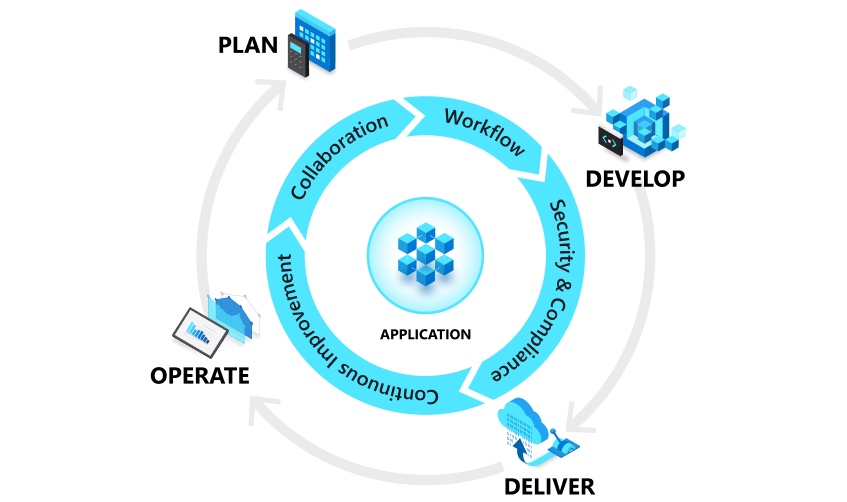5-SECOND SUMMARY:
- The DevOps culture promotes transparency, communication and a spirit of collaboration between development teams, operational teams and business teams. But how to build this culture?
- The four main benefits that this type of culture adds to your teams: alignment, shorter release cycles, continuous learning, and accountability.
You’ve quite possibly come across the term DevOps at some point in your life, especially if you’re at some stage in the process of launching and implementing a digital project. According to Microsoft, DevOps is a mix of development (Dev) and operations (Ops). Its purpose is to deliver value to customers by bringing people, processes and technology together. The ultimate goal is for teams to become more productive by using DevOps practices and tools and simultaneously create, iterate, and improve digital products faster and with higher quality. Rather than having different teams working in silos, with DevOps, they collaborate with a common purpose: to create, iterate, and maintain better and more reliable products, responding even better to a client’s needs. But why is DevOps such an important concept? Firstly, because DevOps has a direct impact on the quality of the digital product. The truth is that DevOps is so much more than just automating processes and improving the client’s code.
How to build a DevOps culture
The DevOps culture promotes transparency, communication and a spirit of collaboration between development teams, operational teams and business teams. It’s a culture that has a profound impact on teams’ work methodology as a whole, their workflows, their processes, and even the quality of the code they deliver. Acting according to this culture has several advantages: it speeds up the product’s iteration timeline, allows us to adapt more quickly to the market and competition, allows for an improvement in the average recovery time, and makes it easier to maintain stability of the systems.
DevOps influences the entire lifecycle of applications, at whatever stage of the process, whether in its planning, development, delivery or maintenance. All these phases are intrinsically linked and depend on each other to deliver the expected final result.

Image: Microsoft
Adopting a tool like Azure DevOps is only the first step, and, frankly, it will always be the least important step. Why? Because it is useless to have the tools, frameworks and methodologies at our disposal if culture and people do not actively intervene in the process of their adoption and guarantee a continuous commitment to their objectives. Building a DevOps culture requires teams to change how they think about issues, work, and collaboration. In truth, that can be challenging and, at times, even demotivating. However, the myriad benefits that are quickly gained eclipse any challenges that arise in creating a culture whose mission is to deliver quality and added value. Some of the benefits to be gained from adopting a DevOps culture are:
1) Teams’ alignment
It will always be easier to achieve alignment between different teams in a given project if they follow DevOps as a standard guideline. Teams start to collaborate and focus on the same goal, ensuring that they are “rowing to the same place”; they have the same goals and measure their success in the same way.
2) Shorter release cycles
These teams are characterised by being more agile. With shorter release cycles, they can plan their work better and manage risk better. Additionally, they can better respond to clients’ needs and better adapt to the market and competition.
3) Continuous learning
Teams that embrace the DevOps culture focus on a growth mindset and incorporate their learnings into their processes to become better and better with each iteration. This journey doesn’t have an end, so the goal is to improve continually.
4) Accountability
Once teams find alignment, they become committed to their goals and the results they need to achieve. Thus, there is a greater involvement from the different teams responsible for different stages of an application’s lifecycle.

Image: Microsoft
Why do we use DevOps at Xpand IT
Quality is part of the organisational values and is something that is rooted in Xpand IT’s culture. We work with different Azure services to ensure we produce and deliver top of the line products to our clients. Azure DevOps plays a crucial role in our ability to deliver everything we set out to do. The Digital Xperience business unit has a team focused on Azure DevOps, whose responsibility is to ensure all projects comply with quality requirements. These projects can be customer-facing, i.e., mobile applications, websites, backend projects where we work with Azure to create solutions that improve business operations, or Power Platform solutions, where we also use DevOps to improve the quality of solutions built on top of this platform.
Learn more about our work methodology and some of the projects we have already developed here.

Digital Xperience Evangelist – Xpand IT














